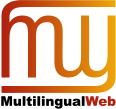Monthly Archives: February 2014
Posts
For review: Update to Declaring character encodings in HTML
An updated version of Declaring character encodings in HTML is out for wide review. We are looking for comments before 7 March. After the review period is over, this content will be copied to the same location as the current version of the document and the URL of the updated version will cease to exist.
The update brings the article in line with recent developments in HTML5, and de-emphasizes information about legacy formats.
An attempt was also made to organize the material so that readers can find information more quickly, and also de-clutters the essential information by moving edge topics, such as UTF-16 and charset links, down the page. This led to the article being almost completely rewritten.
Please send comments to www-international@w3.org.
Alolita Sharma (Wikipedia) to deliver keynote at 7th Multilingual Web Workshop (May 7–8, 2014, Madrid)


We are please to announce that Alolita Sharma, Director of Engineering for Internationalization and Localization at Wikipedia, will deliver the keynote at the 7th Multilingual Web Workshop, “New Horizons for the Multilingual Web,” in Madrid, Spain (7–8 May 2014).
With over 30 million articles in 286 languages as of January 1, 2014, Wikipedia has now become one of the largest providers of multilingual content in the world. Because of its user-generated and constantly changing content, many traditional processes for managing multilingual content on the web either do not work or do not scale well for Wikipedia. Alolita Sharma’s keynote will highlight Wikipedia’s diversity in multilingual user-generated content and the language technologies that Wikipedia has had to develop to support its unprecedented growth of content. She will also discuss the many challenges Wikipedia faces in providing language support for the mobile web.
The Multilingual Web Workshop series brings together participants interested in the best practices, new technologies, and standards needed to help content creators, localizers, language tools developers, and others address the new opportunities and challenges of the multilingual Web. It will provide for networking across communities and building connections.
Registration for the Workshop is free, and early registration is recommended since space at the Workshop is limited.
There is still opportunity for individuals to submit proposals to speak at the workshop. Ideal proposals will highlight emerging challenges or novel solutions for reaching out to a global, multilingual audience. The deadline for speaker proposals is March 14, but early submission is strongly encouraged. See the Call for Participation for more details.
This workshop is made possible by the generous support of the LIDER project, which will organize a roadmapping workshop on linked data and content analytics as one of the tracks at Multilingual Web Workshop.
MultilingualWeb-LT Working Group closed, ITS community continues in ITS IG
The MultilingualWeb-LT Working Group has been closed, since it successfully completed the work in its charter.
We thank the co-chairs, the editors, implementers and the Working Group for achieving the goal to publish Internationalization Tag Set (ITS) 2.0 as a W3C Recommendation, and for doing so ahead of the original schedule.
Work on enlarging the community around ITS, gathering feedback and requirements for future work will now continue in the ITS Interest Group.
Updated article: Inline markup and bidirectional text in HTML
Inline markup and bidirectional text in HTML is a major update of the article formerly titled What You Need to Know About the Bidi Algorithm and Inline Markup, and reflects the recent changes in bidi markup in the HTML5 specification.
Technically speaking, the main change is that the dir attribute now isolates text by default with respect to the bidi algorithm. Isolation as a default is the recommendation of the Unicode Standard as of version 6.3.
For the less technical-minded, the main advantage of this change is a much simpler transition for both content authors and browser developers who want reap the benefits of isolation. At the same time, these approaches have good results for existing legacy content.
New translations into German
Personennamen aus aller Welt (Personal names around the world)
Angabe der Sprache in HTML (Declaring language in HTML)
Stylen anhand von Sprachattributen (Styling using language attributes)
Kennzeichnung der Sprache von Linkzielen (Indicating the language of a link destination)
Warum man Sprachattribute verwenden sollte (Why use the language attribute?)
Unicode-Steuerzeichen vs. Markup für bidirektionalen Text (Unicode controls vs. markup for bidi support)
Verwendung von Unicode-Steuerzeichen für bidirektionalen Text (Using Unicode controls for bidi text)
HTML-Seiten in arabischer, hebräischer und anderen von rechts nach links geschriebenen Schriften erstellen (Creating HTML Pages in Arabic, Hebrew and Other Right-to-left Scripts)
Umgang mit Sprachangaben in HTML (Working with language in HTML)
These articles were translated into German thanks to Gunnar Bittersmann.
Call for position statements: Linked Data for Language Technology #LiderEU
The LD4LT (Linked Data for Language Technology) Workshop will be held on 21 March, in Athens, Greece, aligned with the European Data Forum 2014. See the agenda.
The workshop is a free community event – there is no admission fee for participants, but registration is required.
You are encouraged to provide a title for a position statement in your registration form. This is a simple, short statement that summarizes your ideas / technologies / use cases related to Linked Data and Language Technology.
The meeting is supported by the LIDER project, the MultilingualWeb community, the NLP2RDF project, the Working Group for Open Data in Linguistics as well as the DBpedia Project.
As input to the discussion and the work of the LD4LT group, you may also want to fill in the first LIDER survey.
W3C® liability, trademark and permissive license rules apply.
Questions or comments? ishida@w3.org